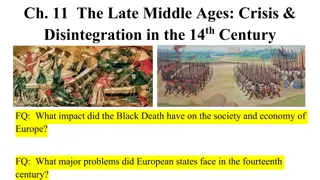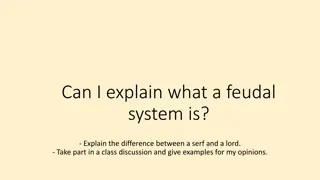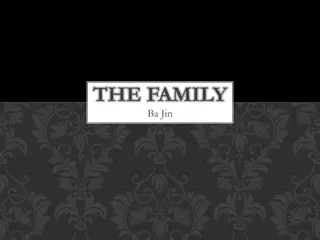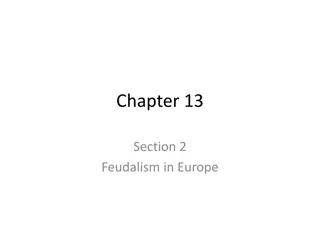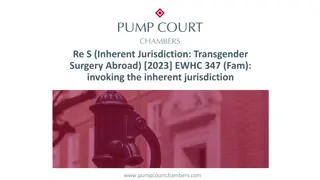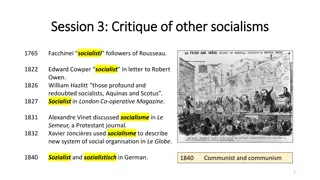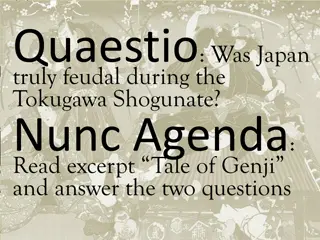The Formation of Intellectuals in Society: Insights from Gramsci
Intellectuals are individuals who utilize their intellect and specialized education to generate ideas and knowledge essential for the functioning of societal production systems. Gramsci delves into how different social groups or classes form their own intellectuals, highlighting processes, historica
0 views • 20 slides
Understanding Liberalism: Key Ideas and Historical Context
Liberalism, a prominent political ideology, emerged in the 19th century and is closely linked to capitalism. It stands against absolutism and feudal privileges, advocating for individualism, freedom, reason, equality, toleration, consent, and constitutionalism. The evolution of liberalism emphasized
1 views • 18 slides
Impact of the Black Death on the Late Middle Ages in Europe
The Black Death had a profound impact on European society and economy in the 14th century, causing social and economic upheaval, labor shortage, increased wages, and anti-Semitic sentiments. It also led to peasant revolts and the disintegration of medieval life, ultimately contributing to the breakd
5 views • 10 slides
Understanding the Feudal System: Lords, Serfs, and Hierarchy
The Feudal System was a social hierarchy where the king held control, and peasants did the work at the bottom. Lords owned the land while serfs worked on it. Explore the differences between a lord and a serf, how the system provided order and stability, and the new form introduced in England. Join a
1 views • 5 slides
State Re-structuring and Federalism in Nepal by Resham Kandel
State restructuring in Nepal involves the redistribution of power across different tiers of government and the redesign of governance structures to achieve political, economic, social, and administrative transformation. The concept focuses on decentralization, inclusivity, and proportional represent
0 views • 26 slides
The Family by Ba Jin: A Tale of Struggle and Revolution in 20th Century China
The Family by Ba Jin delves into the lives of the Kao brothers, highlighting their resistance against oppressive feudal authority in early 20th century China. The story follows the struggles of Kao Chueh-hsin, Kao Chueh-min, and Kao Chueh-hui as they navigate societal expectations and personal desir
0 views • 8 slides
Japanese Feudalism Under the Shoguns: A Historical Overview
The period of feudalism in Japan from the 12th to the 19th century under the Shoguns is explored in this reading activity. It delves into the social structure, roles of different classes like daimyo, samurai, artisans, and merchants, as well as the power dynamics between the Emperor and the shogun.
1 views • 14 slides
Feudalism in Europe: New Invasions and the Emergence of Feudalism
New invasions by Vikings, Magyars, and Muslims brought chaos to Western Europe, leading to the decline of central authority. Feudalism emerged as a system of governing and landowning, based on mutual obligations between lords and vassals. The Feudal Pyramid structured society, with kings at the peak
0 views • 19 slides
The Evolution of Bourgeois Politics in 17th Century England: Insights from Hobbes and Locke
The emergence of bourgeois politics in 17th century England marked a significant shift in power dynamics as capitalism began to take hold. The bourgeoisie initially allied with the monarchy to overthrow the feudal order but later turned against the royal power. The Puritan Revolution and the Gloriou
0 views • 20 slides
Evolution of Wardship and Inherent Jurisdiction in English Law
The concept of wardship, originating in the Middle Ages, evolved over time to prioritize the welfare of children under the Court's care. Wardship transitioned from feudal control to protection against parental abuse, with broad powers granted to the High Court. Changes in legislation, such as the Fa
0 views • 36 slides
Critique of Various Socialisms Throughout History
Critique various socialisms from history - including feudal socialism, petty-bourgeois socialism, and German or True Socialism. Discusses the origins, criticisms, and impact of these ideologies on societal structures and historical movements.
0 views • 14 slides
Understanding Feudal Japan: The Tale of Genji and Tokugawa Shogunate
Explore the evolution of feudalism in Japan through the Heian Period, highlighted by Murasaki Shikibu's groundbreaking work, "The Tale of Genji." Delve into the decentralized governance of the Tokugawa Shogunate and the dynamics of power between central rulers and local lords. Uncover the cultural i
0 views • 12 slides
Life in European Middle Ages: Social Structure and Daily Practices
The European Middle Ages witnessed a structured society with different classes such as workers, serfs, urban workers, warriors, and worshipers. Workers predominantly engaged in agricultural activities, serfs were bound to labor services and dues, urban workers faced economic challenges, warriors com
0 views • 14 slides


